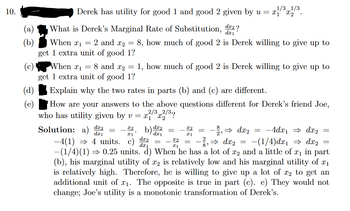(a) (b) (c) 1/3 1/3 Derek has utility for good 1 and good 2 given by u = x₁x₂. What is Derek's Marginal Rate of Substitution, d2 ? dx₁ When ₁2 and 2 = 8, how much of good 2 is Derek willing to give up to get 1 extra unit of good 1? = 8 and ₂ When 1 get 1 extra unit of good 1? = 1, how much of good 2 is Derek willing to give up to
(a) (b) (c) 1/3 1/3 Derek has utility for good 1 and good 2 given by u = x₁x₂. What is Derek's Marginal Rate of Substitution, d2 ? dx₁ When ₁2 and 2 = 8, how much of good 2 is Derek willing to give up to get 1 extra unit of good 1? = 8 and ₂ When 1 get 1 extra unit of good 1? = 1, how much of good 2 is Derek willing to give up to
Chapter1: Making Economics Decisions
Section: Chapter Questions
Problem 1QTC
Related questions
Question
can you explain how they got the answers here

Transcribed Image Text:10.
Derek has utility for good 1 and good 2 given by u = x1/³x/³.
(d)
(e)
What is Derek's Marginal Rate of Substitution, dr2?
When ₁ = 2 and x2 = 8, how much of good 2 is Derek willing to give up to
get 1 extra unit of good 1?
(c)
When x₁ = 8 and x₂ = 1, how much of good 2 is Derek willing to give up to
get 1 extra unit of good 1?
Explain why the two rates in parts (b) and (c) are different.
How are your answers to the above questions different for Derek's friend Joe,
who has utility given by v = x²/³x2/³?
Solution: a) dx2
X2
I1
dx2
X2
⇒ dx₂
dx₁
X1
-4dx₁ ⇒ dx₂
-4(1) ⇒ 4 units. c)
-(1/4) dx₁ ⇒ dx2
−(1/4)(1) ⇒ 0.25 units. d) When he has a lot of x2 and a little of x₁ in part
(b), his marginal utility of x2 is relatively low and his marginal utility of £₁
is relatively high. Therefore, he is willing to give up a lot of x2 to get an
additional unit of x₁. The opposite is true in part (c). e) They would not
change; Joe's utility is a monotonic transformation of Derek's.
dx2
dx1
=
X2
I1
→dx₂
-
=
=
Expert Solution
This question has been solved!
Explore an expertly crafted, step-by-step solution for a thorough understanding of key concepts.
Step by step
Solved in 5 steps with 13 images

Follow-up Questions
Read through expert solutions to related follow-up questions below.
Follow-up Question
can you now solve part d and e

Transcribed Image Text:10.
(a)
(c)
1/3 1/3
Derek has utility for good 1 and good 2 given by u = x₁x₂
dx2?
What is Derek's Marginal Rate of Substitution,
When 1 =
2 and 2
8, how much of good 2 is Derek willing to give up to
get 1 extra unit of good 1?
=
When 1 = 8 and ₂ =
get 1 extra unit of good 1?
Explain why the two rates in parts (b) and (c) are different.
How are your answers to the above questions different for Derek's friend Joe,
who has utility given by v = x²/³x2/³?
Solution:
dx2
dz₁
1, how much of good 2 is Derek willing to give up to
dx2
dx₁
x2
I1
−4(1) ⇒ 4 units. c) da
⇒ dx₂
-4dx₁ ⇒ dx2
-(1/4)dx₁ ⇒ dx₂
-(1/4)(1) ⇒ 0.25 units. d) When he has a lot of x2 and a little of x₁ in part
(b), his marginal utility of x2 is relatively low and his marginal utility of x₁
is relatively high. Therefore, he is willing to give up a lot of 2 to get an
additional unit of ₁. The opposite is true in part (c). e) They would not
change; Joe's utility is a monotonic transformation of Derek's.
X2
x2
I1
=
⇒ dx₂
-
=
=
=
Solution
Knowledge Booster
Learn more about
Need a deep-dive on the concept behind this application? Look no further. Learn more about this topic, economics and related others by exploring similar questions and additional content below.Recommended textbooks for you


Principles of Economics (12th Edition)
Economics
ISBN:
9780134078779
Author:
Karl E. Case, Ray C. Fair, Sharon E. Oster
Publisher:
PEARSON

Engineering Economy (17th Edition)
Economics
ISBN:
9780134870069
Author:
William G. Sullivan, Elin M. Wicks, C. Patrick Koelling
Publisher:
PEARSON


Principles of Economics (12th Edition)
Economics
ISBN:
9780134078779
Author:
Karl E. Case, Ray C. Fair, Sharon E. Oster
Publisher:
PEARSON

Engineering Economy (17th Edition)
Economics
ISBN:
9780134870069
Author:
William G. Sullivan, Elin M. Wicks, C. Patrick Koelling
Publisher:
PEARSON

Principles of Economics (MindTap Course List)
Economics
ISBN:
9781305585126
Author:
N. Gregory Mankiw
Publisher:
Cengage Learning

Managerial Economics: A Problem Solving Approach
Economics
ISBN:
9781337106665
Author:
Luke M. Froeb, Brian T. McCann, Michael R. Ward, Mike Shor
Publisher:
Cengage Learning

Managerial Economics & Business Strategy (Mcgraw-…
Economics
ISBN:
9781259290619
Author:
Michael Baye, Jeff Prince
Publisher:
McGraw-Hill Education